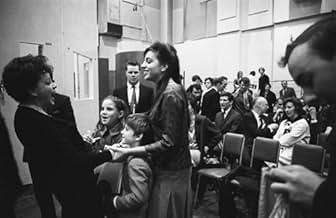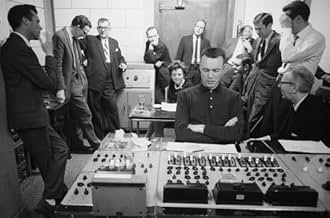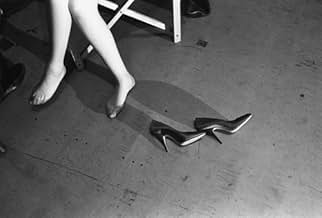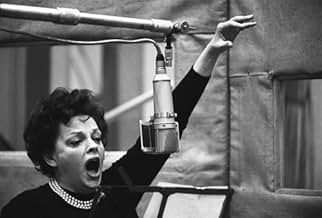Jenny Bowman is a successful singer who visits David Donne to see her son Matt again, spending a few glorious days with him while his father is away in Rome in an attempt to attain the famil... Read allJenny Bowman is a successful singer who visits David Donne to see her son Matt again, spending a few glorious days with him while his father is away in Rome in an attempt to attain the family that she never had.Jenny Bowman is a successful singer who visits David Donne to see her son Matt again, spending a few glorious days with him while his father is away in Rome in an attempt to attain the family that she never had.
- Director
- Writers
- Stars
- Backstage Parent
- (uncredited)
- …
- HMS Pinafore Audience
- (uncredited)
- …
- Theatre Audience
- (uncredited)
- Director
- Writers
- All cast & crew
- Production, box office & more at IMDbPro
Featured reviews
Some twenty years before young medical student Dirk Bogarde, studying in America fell in love with singer Judy Garland just starting her career. That career is something she wanted more than him. But one thing couldn't be changed and that was the boy child Bogarde left with her.
Bogarde marries a girl from Great Britain and later on Judy who can't manage a baby and a career gives him up to Bogarde who adopts his own son with his wife and raises him. Now his wife is dead and Judy's back to lay a claim on her son played by Gregory Phillips.
Of course Bogarde has never told his son about his origin and therein lies the story. It's the kind of tale we've seen in hundreds of films and radio and television soap operas.
But of course what makes I Could Go On Singing special is the singing of Judy Garland. Giving this film which title could serve as her epitaph is Harold Arlen and E.Y. Harburg who wrote the title song and who wrote her famous Over The Rainbow.
Judy also sings By Myself which was sung and danced to by Fred Astaire in The Bandwagon. But a song I'm really glad she did was the Kurt Weill-Maxwell Anderson song It Never Was You. That song comes from the score of Knickerbocker Holiday and it didn't make the screen version. I'm glad that Judy Garland used it in this film, giving it the classiest interpretation possible.
A passable enough drama, but great singing and the best epitaph possible for a career which was one of the brightest.
Garland's character, Jenny Bowman, is a thinly disguised self-portrait, down to the fluttery neurotic mannerisms (with hints of pill-popping) and the ability to turn around an audience kept waiting an hour past time for her show at the London Palladium- where Garland had sensationally headlined in 1960. After "A Star is Born" Garland, cheated of her rightful Oscar, had withdrawn to concerts and cabaret for almost a decade except for "A Child is Waiting" and her overheated cameo in "Judgement at Nuremberg". Here, for the last time, she essays full-blooded emotional acting against a worthy British opponent (for James Mason, think Dirk Bogarde) and carries it off pretty well, never becoming tiresome and often laughing at her own overwrought persona. She still looks pretty, too, not quite overwhelmed by the blowsiness of her last few years.
Bogarde, rapidly maturing after his daring role in "Victim", is a superb, challenging foil. Watch how he turns on a sixpence from the surgeon to the ex-lover after reassuring Garland that her throat is okay. His buttoned-up Britishness is never dull; like Ronald Colman, he radiates reliability and sensitivity in a coherent combination. He claimed to have rewritten all his dialogue with Garland during shooting; certainly their exchanges have a cut and thrust which prevents her from chewing the scenery. She has to react as well as posture.
The fans are given generous dollops of Garland's act in between plot scenes, but these reasonably complement and underscore the themes of defiance and sacrifice. Yes, it's soapy and lush, with daft interludes like the helicopter flight over London. But a touch of Limey stiff upper lip takes the saccharine taste away, and the Ronald Neame of "Tunes of Glory" and "The Poseidon Adventure" knows how to keep a story rolling along. File with contemporary efforts such as "The VIPs" and "The Yellow Rolls-Royce" as an enjoyable wallow, to be taken with boxes of paper handkerchiefs and chocolates.
Credit goes to a sincere, straightforward screenplay with some tart dialogue for Judy that sounds as if it came from her own true life experiences. Indeed, there are backstage stories that Judy and Dirk worked on the screenplay to tighten the emotional force of the drama and punch up the lines a bit--and if so, they have succeeded brilliantly.
Not only entertaining as a dramatic showcase for Miss Garland, it is also highly recommended for the musical interludes during which she performs at the London Palladium in great arrangements of material like "Hello, Bluebird!", "By Myself" and "I Could Go On Singing", among other melodies, all in full control of her "vibrato in search of a voice" equipment.
As a swansong for the actress, it is incredibly moving and a tribute to both Garland and Bogarde. Bogarde is especially intense in his emotional scenes--reminding me somewhat of the brooding character he played so well in LIBEL (a courtroom drama with Olivia de Havilland). He had become a mature actor by that time and here he is even more impressive.
Medical experts warned Judy would never sing again in the early fifties before she made the astonishing "A Star is Born." Then she went on to her historic national concert tours, and fifteen years after "Star" she made "I Could Go on Singing."
Defying all predictions about her career, Garland triumphed. True, it wasn't easy, for her or her fellow actors and crew. Somehow, though, she just kept bouncing back, overcoming the most formidable obstacles.
Here she's supported by an excellent cast headed by Dirk Bogard in a very strong performance. Ronald Neame's direction is on-target, though the script is a bit uneven. Yet the film is looking better and better, and viewers are growing in their appreciation of this legacy of one of the 20th century's most talented and beloved artists.
Here, Garland plays Jenny Bowman, a famous performer who comes to London with a manager (Jack Klugman) and an assistant (Aline McMahon) to do concerts and goes to see an ex-beau, Dr. David Donne (Dirk Bogarde) with a faux medical problem. He knows she has an ulterior motive.
The two of them had broken up, but later, Jenny gave birth to their son. The newlywed David and his wife adopted the child because Jenny couldn't really handle carrying for a new baby and having a career. Matt never knew and believed that both David and his wife were his adopted parents.
Jenny claims that now that David's wife is dead, she just wants to see her son (Gregory Phillips). Once she sees him, she wants to spend time with him - it spirals out of control.
Despite its soapy plot, "I Could Go on Singing" manages to be very effective for two reasons: Judy Garland and Dirk Bogarde, both of whom lift this film up from the maudlin.
Bogarde is an uncredited writer on this film, contributing a lot of Garland's dialogue, as the script needed work before she could take the role; he often participated in screen writing on his films.
Garland plays her role as a brilliant talent who is a needy woman, but one who also is used to getting her way and knows what she wants. Despite an outer fragility, she knows how to stand up for herself.
As an entertainer, she is second to none - magical, warm, exciting, passionate, and fun. Garland sings the title song plus "By Myself," "It Never Was You", and "Hello, Blue Bird," all beautifully performed. Garland looks petite and wonderful as well.
During the scene in the hospital, in which David comes to see Jenny after she sprains her actor, the director, Ronald Neame, realized as the camera was rolling that the scene had passed out of the movie and into real life. Garland was no longer Jenny but Garland.
There was an incredibly intense atmosphere in the room, so instead of yelling cut, doing another take, and repositioning the camera, he let the scene go on. Normally a scene like that would take all day to film.
Bogarde realized that Neame wasn't going to stop and even altered his dialogue to respond to her. The result is an incredibly moving, very personal scene.
Bogarde gives a low-key performance and is perfect opposite Garland, very British, attempting to keep his emotions even -- a very generous actor who was also helpful to Neame in keeping Garland going.
There were a great many difficulties on the set, including an incident where a plate of food went flying through the air as Judy yelled at director Henry Hathaway. In the end, they all made it through, and the result is successful.
We have lots of examples on the screen and in recording of Judy Garland's tremendous talent and brilliance. "I Could Go On Singing" is a look at a character very close to Garland and gives a good sense of the real woman. Art imitates life, or did life imitate art - with Garland, one never knows.
Did you know
- TriviaOfficially regarded as her final film before her death in 1969, Judy Garland filmed it immediately after making Un enfant attend (1963) though L'ombre du passé (1963) was released first. At the time of filming, Garland was going through an ugly child custody battle of her own with her soon-to-be-divorced husband, Sidney Luft. The opportunity to make a film in England with Sir Dirk Bogarde, an actor and friend she had long admired, provided the perfect escape from her problems at home but unfortunately Garland carried her troubles with her across the Atlantic.
- GoofsThe elevator scene in the first third of the movie shows a continuous carpet between the elevator floor and the hallway floor, without a break for the moving elevator, indicating that it is not an actual elevator.
At the same time, you can tell that the elevator operator is squatting toward the front of the elevator, waiting for the partition to rise to make it look like the elevator is coming up from another floor, and as the elevator leaves, you can tell the operator is not moving down with it.
- Quotes
Jenny Bowman: You think you can make me sing? Do you think you can - do you think George can make me sing? or Ida? You can get me there, sure, but can you make me sing? I sing for myself. I sing when I want to, whenever I want to, just for me. I sing for my own pleasure. Whenever I want - do you under stand that?
- ConnectionsEdited into Chop Suey (2001)
- How long is I Could Go on Singing?Powered by Alexa
Details
- Release date
- Countries of origin
- Language
- Also known as
- I Could Go on Singing
- Filming locations
- Production company
- See more company credits at IMDbPro
- Runtime
- 1h 40m(100 min)
- Color
- Aspect ratio
- 2.35 : 1





























